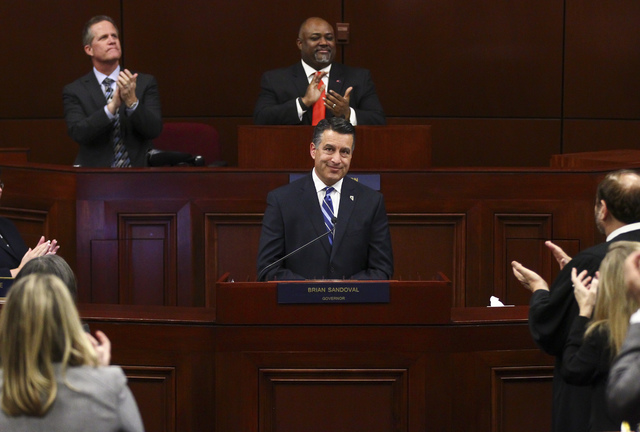What Gov. Brian Sandoval, Sen. Aaron Ford didn’t say in their speeches was as telling as the text
As ever, State of the Fill-In-The-Blank speeches are more notable for the omissions than for the text.
Gov. Brian Sandoval, for example, left a few things out of his fourth and final State of the State address to the Nevada Legislature on Tuesday.
For example, Sandoval did say that he opposed the initiative to legalize recreational marijuana, but nonetheless respected the will of the voters who approved it. But he didn’t mention his respect for the will of the voters who approved Question 1, the gun background check initiative, or any steps he’d take to ensure it was enforced.
Sandoval called on the Legislature to urge soon-to-be-President Trump to help facilitate lithium mining in Nevada, but was silent about calling on lawmakers to urge Trump not to harm Nevada when it comes to repealing the Affordable Care Act. Depending on how it’s done, repeal of the law could throw Sandoval’s carefully balanced, $8.1 billion general fund budget into a serious deficit. (To be fair, the governor this month did send a letter on that subject to House Republican leaders.)
Sandoval proudly announced the expansion of the mission of the Tesla gigafactory near Reno. But he was mum about Southern Nevada’s electric car plans from Faraday Future. That oversight may not have been just a matter of regional bias. It could also be a sign North Las Vegas’s favorite economic development success story might not be as rosy as predicted.
And while Sandoval has plenty of plans to get Nevadans into high-wage jobs in the future — with education, economic development and workforce training — he was mute when it came to talking about improving the wages of the actual jobs Nevadans have right now. Optimism and economic growth are wonderful, but a small dose of pragmatism might be needed to help the flesh-and-blood working people of the state.
But if Sandoval glossed over a few things, so did state Sen. Aaron Ford, D-Las Vegas, who offered the Democratic response.
To his credit, Ford mentioned “fair” wages, including equal pay for women and earned paid sick time. What that translates to in terms of legislation remains to be seen, however.
On taxes, Ford noted that Democrats had joined with Sandoval and many — but not all — legislative Republicans in 2015 to pass the state’s first commerce tax on businesses.
Forgotten was the part about how Democrats had been trying unsuccessfully to raise a business tax for more than a decade, but succeeded only after Republicans took over the Legislature and Sandoval made it a priority.
Also forgotten was the fact that the tax was enacted as part of an overall education-reform package pushed by Republicans that included some initiatives passed over the objections of all or most of the Democratic caucus.
And Ford’s speech also contained a classic: “After a contentious campaign, many Nevadans are rightfully concerned about federal overreach and an incoming administration in Washington, D.C., that may trample on their basic rights.”
One could picture the exact same thing escaping the lips of Republican Attorney General Adam Laxalt back in January 2009, as Barack Obama was about to assume office. Chances are Democrats will use the phrase “federal overreach” for the next four years at least, while the GOP will give it a rest for the same period.
Ford mentioned the “right to affordable health care” in his remarks, too. Bully for him.
But there’s little to no chance we’ll see a bill to cover all Nevada residents under Medicaid, or even a resolution urging Congress to extend Medicare to all Americans in order to effectuate that right.
Too bad. That’s one omission we could all stand to see filled.
Steve Sebelius is a Review-Journal political columnist. Follow him on Twitter (@SteveSebelius) or reach him at 702-387-5276 or SSebelius@reviewjournal.com.







